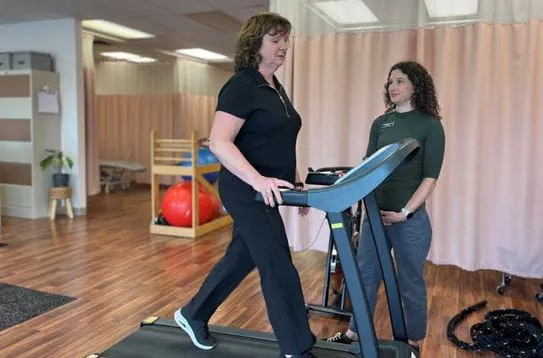Terri’s Journey Through Clinical Research
Words on screen: Kingston, Ontario.
[Bird’s-eye view of Kingston, Ontario showing buildings.]
Terri Swain-Collins: I knew as soon as I woke up for my colonoscopy that something was off.
Words on screen: Terri Swain-Collins.
[Sitting on a park bench, Terri Swain-Collins ties her running shoes, puts on headphones, and goes for a walk.]
Terri: And that's when they told me, yeah, you have stage three colon cancer, you need to see an oncologist. That's when I started seeing Dr. Booth and he told me about this trial.
[Dr Chris Booth appears on screen in a hospital room, sits on a stool and looks straight into the camera.]
Words on screen: The challenge.
[View of Kingston, Ontario’s shoreline as text appears on screen.]
Words on screen: Clinical trials are research studies that look at new ways to prevent, find and treat cancer. They generate the evidence that drives medical progress and rely on real people to make it possible.
[Dr. Chris O’Callaghan standing in a bright office, looking straight at the camera.]
Words on screen: THE INVESTIGATOR.
[Dr. O’Callaghan sitting at a table, speaking directly to the camera in a bright room.]
Dr Chris O’Callaghan: Clinical research is extremely well regulated. It's overseen by multiple authorities. Health Canada, ethics committees. Our organization conducts our clinical research to the highest standards. You're not a guinea pig.
Words on screen: Dr Chris O’Callaghan. Senior investigator. Canadian Cancer Trials Group.
[Dr. O’Callaghan speaking to colleagues in front of a wall showing “Canadian Cancer Trials Group. A national program of the Canadian Cancer Society.”]
Dr O’Callaghan: Our overarching number one motivation is patient safety and patient protection. At the same time, we recognize that there's no other way that we can advance the knowledge and change and improve the treatment of cancer.
[Bird’s-eye view of streets in Kingston, Ontario as text appears on screen.]
Words on screen: Led by Dr. Chris Booth, Dr. Kerry Courneya and a global team of researchers, the CO21 CHALLENGE trial followed 889 colon cancer patients around the world. Funded directly by the Canadian Cancer Society for 17 years, it became one of the largest and longest exercise oncology trials ever conducted.
[Dr Chris Booth standing in a hospital room, facing the camera.]
Words on screen: THE RESEARCHER.
[Dr. Booth sitting on a stool, speaking directly to the camera.]
Dr Booth: The challenge trial was the first randomized trial in the world asking if an exercise program could improve cancer survival.
Words on screen: Dr Chris Booth. Medical oncologist & study co-chair.
Dr Booth: We designed the study in patients with stage two and stage three colon cancer, who had completed their surgery and they had completed chemotherapy.
[Hospital and laboratory procedures performed by experts.]
Dr Booth: Unfortunately, about 30 or 40% of those patients will have their disease recur, and generally their cancer is not curable when it comes back. And so the CHALLENGE trial took those patients, and half of them received a booklet that encouraged them to eat well and to exercise.
[A person signing a document, typing on a computer keyboard, and a view inside a physiotherapy clinic.]
Dr Booth: The other half of the patients got the same booklet, but they got the experimental treatment, which was, a physical activity consultant, essentially a funded personal trainer for three years, with funding provided by the Canadian Cancer Society to the Canadian Cancer Trials Group. And this allowed the study to move forward.
[Bird’s-eye view of walking paths in a park as text appears on screen.]
Words on screen: As part of her three-year trial, Terri was enrolled in the experimental treatment, which included up to 5 hours of moderate exercise a week. With support from her physiotherapist, Alison, she began a routine of structured walking - starting small and building strength over time.
[Terri walking on a treadmill with support from her trainer, Alison.]
Words on screen: THE PATIENT.
Terri: The time commitment was the hardest part, but because I had Allison to be accountable to, I made sure I fit it in.
[Terri sitting on a couch in front of a large window, speaking to the camera.]
Words on screen: Terri Swain-Collins. Cancer patient & trial participant.
Terri: So I'd walk on the treadmill with her and we’d talk and she was always supportive, always trying to figure out ways to help me fit it into my life when I was overwhelmed with things to do.
[Bird’s-eye view of Kingston’s hospital complex.]
Terri: I worked a full-time job at the hospital. I was the program manager of the X-ray department here in Kingston at Hôtel Dieu and Breast Imaging Kingston.
[Alison walking toward the hospital and entering.]
Terri: I would get my walk in in midday, like I would, if I was walking over between the two hospitals. It's about a 15-minute walk, depending. I would add more time in there. So I think that relationship really made a big difference.
[Terri sitting on a couch in front of a large window, speaking to the camera.]
Terri: I think if I had went the other stream where there was no Alison, no trainer. Yeah, chances are I probably would never have done what we did. So I feel lucky that I got to do this.
[Bird’s-eye view of the hospital area from the shore.]
Words on screen: The results
[Screenshots from scientific articles with highlighted phrases such as “significant future implications,” “groundbreaking,” and “significantly long.”]
[Dr Booth speaking to the camera on his hospital room stool.]
Dr Booth: I still remember the Friday afternoon in February of 2025 when the statistician shared the results with us, and they were astounding. The patients on the exercise program clearly increased their exercise compared to the other patients. Objective improvements in their measures of fitness.
[A line graph appears on screen comparing “Exercise Results” in “Structured Exercise Program (SEP) participants” and “Health Education Materials (HEM) participants” by year, with SEP participants showing a higher rise.]
Dr Booth: The exercise program led to a 28% reduction in the risk of recurrent new cancer or death. And it led to a 37% reduction in the risk of death.
[Two pie charts appear on screen: one showing “28.0% Reduction in Risk of Recurrent, New Cancer, or Death,” and the other showing “37.0% Reduction in Risk of Death.”]
[Dr. O’Callaghan sitting at a table, speaking directly to the camera in a bright room.]
Dr O’Callaghan: Every metric was positive. The disease-free survival was positive. The overall survival was positive. The quality of life metrics were positive. It's a, it's a blockbuster. It's a home run.
[Screenshots from scientific articles with highlighted phrases such as “disease-free survival was 80.3%,” “overall survival was 90.3%,” and “significantly longer disease-free survival.”]
[Dr. O’Callaghan at his office desk, working on his computer and taking notes.]
Dr O’Callaghan: To put too fine a point on it, the idea that this trial has now demonstrated that patients who are post-colon cancer resection and adjuvant chemotherapy will live longer and have less cancer recurrence if they are able to achieve the exercise goals that we saw in our trial changes the future.
[Bird’s-eye view of the hospital area from the shore.]
Words on screen: Changing the future
[Dr Booth speaking to the camera.]
Dr Booth: So we're in discussions right now with health system leaders here in Ontario and actually around the world about exactly what this will look like. My ideal model would be, the patient gets referred into the cancer system. They get high-quality surgery. When they finish their surgery, they see myself, I give them chemotherapy and that there's a model in place where I can then refer them to a publicly funded exercise specialist.
[Dr. Booth walking through hospital halls.]
Dr Booth: We live in an era now where many of our cancer treatments cost $100,000, $200- $300,000 per year. We're doing a formal economic analysis right now, but our back-of-the-envelope cost of a personal trainer meeting twice a month for a year, and then monthly after that. It's in the range of $2,000 or $3,000. So this is a remarkably affordable intervention that really, I think we're at a point where the health system can't afford to not do this.
Words on screen: THE PROBLEM: Most patients only hear about clinical trials by chance - through a doctor, a friend or a stroke of luck.
Dr Booth: Most patients probably learn from trials by their treating doctor. But patients also are really interested in getting their own information.
[Dr. O’Callaghan sitting at a table, speaking directly to the camera in a bright room.]
Dr O’Callaghan: Terri knew because her oncologist was the head of the clinical trial. She happened to be at a treatment centre where the trial was being conducted, and she was seen by an oncologist who was involved in that trial.
[Terri speaking with her trainer in an office.]
[Dr Booth walking on the sidewalk with his backpack.]
Dr O’Callaghan: That is the way that the vast majority of patients become aware of clinical trials, and participate in them.
Words on screen: THE SOLUTION: Now, Cancer Trials Canada offers a way to search active clinical trials - based on cancer type and location.
[An interactive walkthrough of the cancertrialscanada.ca website interface.]
Dr Booth: The Cancer Trials Canada website will fill an important information void for patients who are often overwhelmed when they're looking for different clinical trial options. It's also something that I, as an oncologist and my colleagues, will find very helpful. And so having access to a national database that's maintained and run by a trusted voice would be invaluable for both the clinicians and the patients.
[View of the hospital interior and exterior, emphasizing the “George St. Entrance” and a “Chemotherapy” direction sign.]
Words on screen: The new standard of care
Dr O’Callaghan: This is how we advance the state of science. We do want patients to feel reassured that if you join a clinical trial, you will, at a minimum, receive the standard of care that you would otherwise have. And in fact, there's actually some good evidence out there that suggests that even people who go on a clinical trial and get the standard of care tend to do better than people who get the standard of care off the trial.
[Dr. Booth walking through the halls, passing a poster reading “Research of a lifetime.”]
Dr Booth: Cancer clinical trials are really an important opportunity for patients to have some agency over their treatment decision-making in health care beyond the usual standard treatments.
[Terri doing physical exercise, consulting with her trainer.]
Dr Booth: Often for patients, it is about creating a legacy and giving back and empowering the next generation of patients. And I think that people can find that very gratifying. In all of the emotional challenges and upset of a cancer journey, this can be something that gives them agency and a sense of control.
[Terri walking on the sidewalk with headphones on.]
Terri: I just saw Dr. Booth last week. Things look pretty good with no recurrence of cancer in, yeah, year four. So I see him one more time, in a year, and then, yeah, he sets me free.
[Terri walking by the shore with headphones on.]
Terri: This clinical trial gave me a way to take some control of my own cancer recovery in my own time and do it my own way.
Words on screen: Thank you for fueling world-leading research
Words on screen: Learn more at cancer.ca
[The Canadian Cancer Society logo and the words “It takes a society” appear on screen.]


